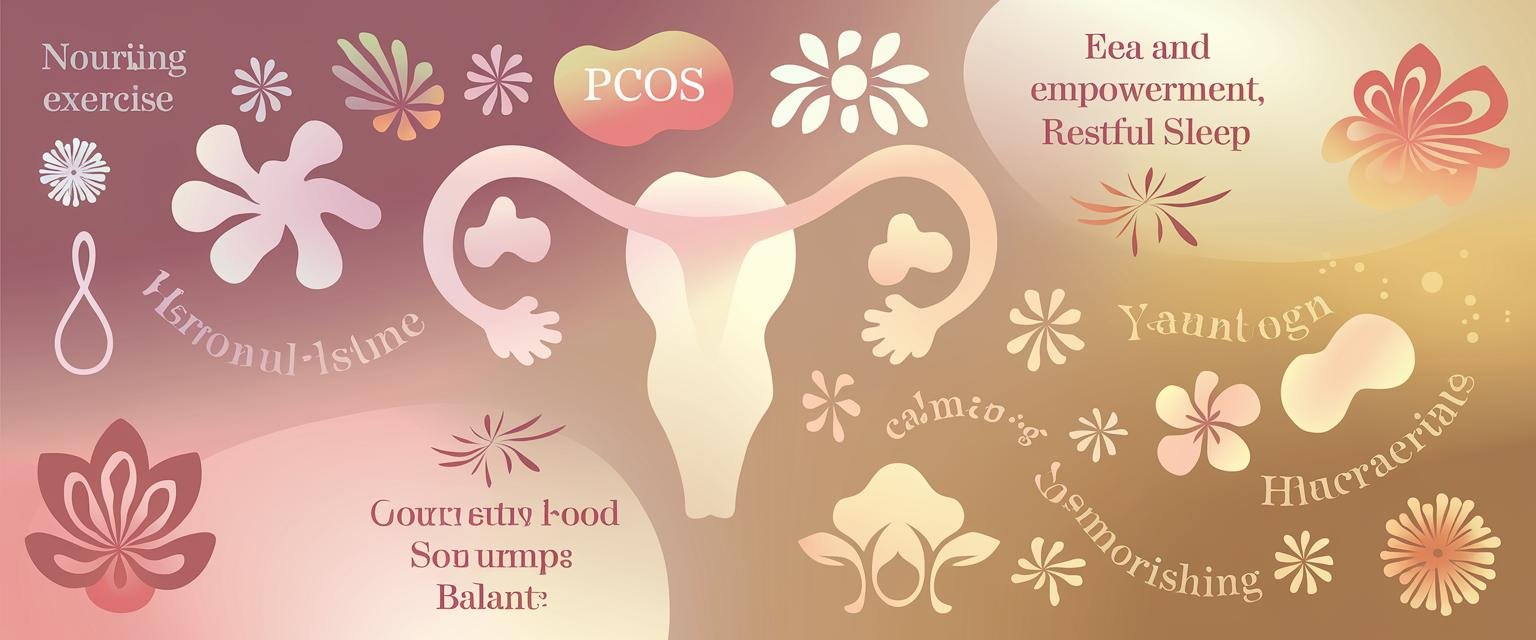Irregular Periods PCOS: Soothing Lifestyle Toolkit
Introduction
Does your menstrual calendar look more like abstract art than a predictable pattern? For many women with PCOS, irregular periods can feel frustrating and isolating. Those unpredictable cycles aren’t just inconvenient—they can affect your daily life, emotional wellbeing, and long-term health. But here’s the comforting truth: gentle lifestyle shifts can help bring harmony to your hormonal rhythms. This guide offers practical ways to support your body through PCOS-related period irregularities with compassion and care.
Table of Contents
- Understanding PCOS & How It Affects Your Periods
- Supportive Lifestyle Changes for Period Regulation
- Emotional Wellness While Managing PCOS
- Quick Wellness Questions
- Finding Your Path Forward
Understanding PCOS & How It Affects Your Periods
The Hormonal Connection
Polycystic Ovary Syndrome (PCOS) affects how your ovaries work. With PCOS, your body produces higher levels of androgens (often called “male hormones,” though all women naturally have some). This hormonal imbalance can prevent eggs from maturing properly, which means ovulation might not happen regularly—or at all. Without ovulation, the predictable menstrual rhythm gets disrupted, leading to missed, delayed, or unusually heavy periods.
Common Period Patterns with PCOS
When living with PCOS, your period might follow several patterns. Some women experience oligomenorrhea (periods that come less than 8 times per year), while others face amenorrhea (missing periods for months). When periods do arrive, they might be unusually heavy or prolonged. Understanding your personal pattern is the first step toward regaining balance.
The good news? These patterns can respond positively to thoughtful lifestyle adjustments. Your body has an amazing capacity to find equilibrium with the right support.
Supportive Lifestyle Changes for Period Regulation
Nourishment That Supports Hormonal Balance
What you eat creates the foundation for hormonal health. Focus on adding anti-inflammatory foods rather than restricting: colorful vegetables, fruits, whole grains, healthy fats like avocados and olive oil, and protein from plants and lean animal sources. Specific foods that may help include cinnamon (which can improve insulin sensitivity), fatty fish rich in omega-3s, and leafy greens packed with B vitamins.
Movement That Respects Your Body
Exercise affects hormones in powerful ways, but intensity matters. High-intensity workouts can sometimes stress hormonal systems that are already struggling. Instead, try gentle strength training, walking, swimming, or yoga practices designed for hormonal balance. Aim for 30 minutes most days, but listen to your body—some days, gentle stretching might be exactly what you need.
Sleep: Your Hormonal Reset Button
Quality sleep directly impacts reproductive hormones. Create a sleep sanctuary: keep your bedroom cool and dark, establish a calming pre-sleep routine, and try to maintain consistent sleep-wake times. If racing thoughts keep you awake, try a “worry journal” to transfer concerns from your mind to paper before bedtime.
Emotional Wellness While Managing PCOS
Recognizing the Emotional Impact
Living with unpredictable periods affects more than your physical health—it touches your emotional wellbeing too. Many women report feelings of frustration, sadness, or worry about their reproductive health. These feelings are valid and acknowledging them is an important part of holistic healing.
Stress Management for Hormonal Support
Chronic stress can worsen hormonal imbalances, creating a challenging cycle. Simple stress-relief practices can make a meaningful difference. Try box breathing (inhale for 4 counts, hold for 4, exhale for 4, hold for 4), a 10-minute daily meditation, or gentle walking in nature. Even brief moments of calm can help regulate stress hormones that influence your menstrual cycle.
Building Your Support System
Connect with understanding healthcare providers who specialize in PCOS and women’s health. Consider joining PCOS support groups online or in your community. Sharing experiences with others who truly understand can provide emotional relief and practical wisdom that clinical advice alone might miss.
Quick Wellness Questions
Q: What are PCOS periods typically like?
A: PCOS periods often follow irregular patterns—they might be infrequent (coming less than 8 times a year), absent for months, or unusually heavy when they do arrive. Some women experience prolonged bleeding or unpredictable spotting. The experience varies widely between individuals, which is why personalized care is so important.
Q: What causes irregular periods besides PCOS?
A: While PCOS is a common cause, irregular periods can also result from thyroid disorders, excessive exercise, significant weight changes, stress, perimenopause, certain medications, or structural issues in the reproductive system. This is why proper diagnosis is crucial before assuming PCOS is the cause.
Q: How quickly can lifestyle changes help regulate my periods?
A: Patience is key—hormonal systems respond gradually to lifestyle changes. Some women notice improvements within 3-6 months, while others may need longer. Consistency matters more than speed. Think of these changes as gentle nudges rather than dramatic interventions.
Q: Is it normal to have mood changes with irregular periods?
A: Absolutely. Hormonal fluctuations directly affect brain chemistry, which influences mood. Many women with PCOS report mood swings, irritability, or low moods, especially around unpredictable periods. These emotional experiences are valid and deserve compassionate attention as part of your overall care plan.
Finding Your Path Forward
Living with PCOS-related period irregularities isn’t just about managing symptoms—it’s about creating a lifestyle that supports your whole being. Remember that small, consistent changes often bring the most sustainable results. Your path may not be linear, and that’s perfectly okay. One practical step you might take today: choose just one supportive practice from this guide—perhaps a new bedtime routine or adding an anti-inflammatory food to your meals—and give yourself permission to begin exactly where you are.
Subscribe to our newsletter for weekly wellness tips and mindful practices from Hey Mandala.

